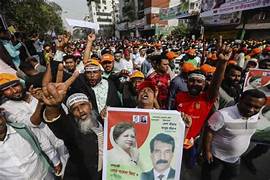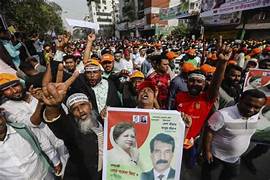
India’s need to maintain a vigilant stance on the recent coup in Bangladesh is underscored by several intertwined factors that impact both nations’ stability, security, and economic interests.
Political Instability and Economic Fallout Bangladesh coup 2024
The current turmoil in Bangladesh, triggered by economic dissatisfaction and the controversial reinstatement of job quotas, mirrors the crisis that hit Sri Lanka in 2022. The protests have been fueled by economic hardships, with Bangladesh’s GDP growth slowing and inflation soaring (mint) (JGU Pure). The potential for prolonged instability in Bangladesh poses a direct threat to India’s border regions, particularly the northeastern states, which could experience spillover effects from the unrest.
Security Concerns Bangladesh coup 2024
Sheikh Hasina’s government has been a key ally for India in combating insurgencies in its northeastern states. The cooperation between the two countries has significantly reduced the activities of insurgent groups like the United Liberation Front of Asom (ULFA). A change in government, especially one involving the BNP and Jamaat-e-Islami, could lead to a resurgence of these groups. The BNP and Jamaat have historically been less cooperative with India on security matters, and their rise to power could see a rollback of the stringent measures taken against insurgents (mint) (JGU Pure).
Geopolitical Implications Bangladesh coup 2024
The geopolitical implications of the coup are significant. China’s influence in South Asia has been steadily increasing, and a political shift in Bangladesh could tilt the balance further in Beijing’s favor. Sheikh Hasina has managed to balance economic engagement with China while addressing India’s security concerns. However, a new government led by the BNP, which has closer ties with China, could prioritize Chinese interests over India’s, leading to increased Chinese presence and influence in Bangladesh. This shift could complicate India’s strategic position in the region (mint) (JGU Pure).
Economic Integration and Development Bangladesh coup 2024
Bangladesh is crucial for the economic development of India’s northeastern states. Initiatives like port access and infrastructure projects are aimed at integrating this region with Bangladesh and other neighboring countries. The current unrest and potential policy shifts under a new government could disrupt these projects, hindering regional economic integration and development. India’s efforts to enhance connectivity and economic ties with Bangladesh could face significant setbacks if the new government does not prioritize these initiatives (mint) (JGU Pure).
Humanitarian and Diplomatic Concerns
The humanitarian aspect of the coup cannot be ignored. The political instability in Bangladesh could lead to an influx of refugees into India, particularly into the northeastern states. Additionally, there is a risk of aggressive actions by protestors towards Indian nationals or diplomatic missions in Bangladesh. India’s diplomatic response to these challenges will be crucial in maintaining stability and protecting its interests in the region (mint) (JGU Pure).
Table of Contents
Cultural and Historical Ties
The deep cultural and historical ties between India and Bangladesh further complicate the situation. The two countries share a long and complex history, with Bangladesh emerging as an independent nation with India’s support in 1971. Since then, the relationship has been shaped by both cooperation and conflict. The current crisis threatens to undo years of diplomatic and economic efforts to strengthen this bond (mint) (JGU Pure).
Strategic Interests
India’s strategic interests in Bangladesh are multi-faceted. Apart from security and economic cooperation, India has been involved in numerous developmental projects in Bangladesh. These projects are aimed at fostering goodwill and creating a favorable environment for bilateral relations. The instability in Bangladesh jeopardizes these projects and India’s long-term strategic interests in the region (mint) (JGU Pure).
Conclusion
India’s need to maintain a wary eye on the coup in Bangladesh is driven by a combination of political, economic, security, and humanitarian concerns. The potential for prolonged instability and a shift in power dynamics in Bangladesh poses significant risks for India. New Delhi must navigate this complex situation carefully to safeguard its interests and maintain regional stability.








